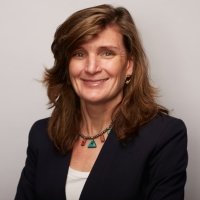Women in Public Service in Africa: A Pledge for Parity
On May 25, 2016, the Wilson Center Africa Program and Women in Public Service Project hosted a panel discussion on “Women in Public Service in Africa: A Pledge for Parity.” The event was a part of the Africa Day Celebration hosted in partnership with the African Ambassadors’ Group. Gwen Young, Director of the Women in Public Service Project at the Wilson Center, provided opening remarks and moderated the discussion with H.E. Prof. Hassana Alidou, Congressmember Karen Bass, H.E. Prof. Mathilde Mukantabana, and H.E. Oliver Wonekha.
In her opening remarks, Ms. Young highlighted the strides that African nations have made in increasing women’s political participation and representation in public service. Ms. Young lauded Rwanda as a shining example of women’s inclusion in government, with the highest percentage of female legislators in the world (64 percent). She noted that despite these gains, women seeking to participate in public service in African states still face challenges.
Acknowledging the achievements of some countries in increasing women’s inclusion in public service, H.E. Prof. Hassana Alidou, Ambassador of the Republic of Niger to the United States, highlighted that many nations are still struggling to achieve parity between men and women in the public sphere. She stated some of the ways in which higher levels of participation might be attained, including promoting solidarity between African women, improving the understanding of the role of African women within their respective communities and the international community, and taking a more nuanced approach when considering the major factors stifling women’s agency. Later in the discussion, Ambassador Alidou added that two major indicators determining a country’s ability to attain gender parity include the existence of peace and economic growth.
H.E. Prof. Mathilde Mukantabana, Ambassador of the Republic of Rwanda to the United States, discussed Rwanda’s achievements in promoting women’s inclusion in public service. She remarked that this success is partly because women’s parity has become an intergenerational discussion within the country and that Rwandan men have become strong advocates for women’s participation. In addition, Ambassador Mukantabana highlighted a number of initiatives Rwanda adopted to facilitate greater participation by women in government, including addressing issues of land rights and land inheritance.
Reaffirming Africa’s progress in promoting gender parity, Congressmember Karen Bass, Representative from California’s 37th Congressional District, said Africa will lead the way in terms of the number of women in leadership positions. Congressmember Bass encouraged African states to adopt affirmative action programs despite the criticisms that might arise. She also touched on the unique perspective and leadership styles women leaders tend to bring, including being highly collaborative.
H.E. Oliver Wonekha, Ambassador of Uganda to the United States, continued the discussion regarding the importance of affirmative action in promoting parity. She opened her remarks by reading Articles 32 and 33 of the Ugandan Constitution, which legally enshrine affirmative action in favor of marginalized groups as well as social and economic equality between men and women. She discussed her own experience and how affirmative action provided her with the opportunity to become involved in the public sphere. Ambassador Wonekha also described the significant gains made in passing legislation related to women—including issues of FGM, maternal leave, and marital rights—that she and her fellow female members of parliament were able to make by collaborating through the Ugandan Women’s Parliamentary Association. According to Ambassador Wonekha, it is critical for women to participate in public spaces to raise issues that affect them and promote an agenda that benefits them.
This event was livestreamed and livetweeted. Follow the Africa Program Twitter account @AfricaUpClose and catch up on the conversation using the hashtag #pledgeforparity.
Speakers


Hosted By

Africa Program
The Africa Program works to address the most critical issues facing Africa and US-Africa relations, build mutually beneficial US-Africa relations, and enhance knowledge and understanding about Africa in the United States. The Program achieves its mission through in-depth research and analyses, public discussion, working groups, and briefings that bring together policymakers, practitioners, and subject matter experts to analyze and offer practical options for tackling key challenges in Africa and in US-Africa relations. Read more


Global Women's Leadership Initiative
The Global Women’s Leadership Initiative has hosted the Women in Public Service Project at the Wilson Center since June, 2012. The Women in Public Service Project will accelerate global progress towards women’s equal participation in policy and political leadership to create more dynamic and inclusive institutions that leverage the full potential of the world’s population to change the way global solutions are forged. Read more
